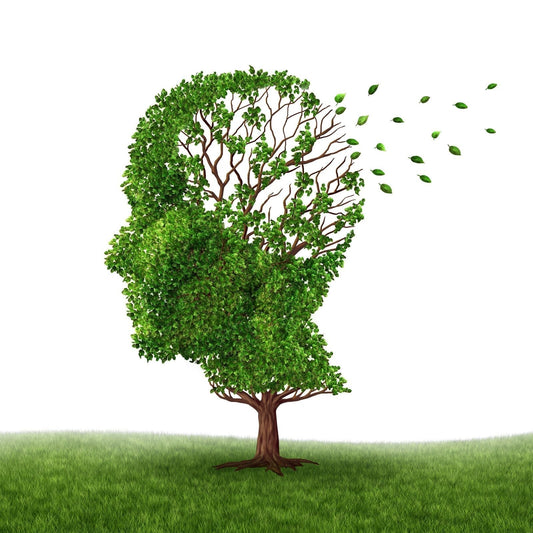
The essential benefits of vitamin B12
Vitamin B12's benefits are extensive, impacting several critical aspects of human health. There are markers that are more commonly associated with B12 deficiency (such as low energy), though it may come as a surprise as to just how far reaching this vitamin is with regards to health.
Neurological function:
Firstly, its contribution to neurological function cannot be overstated. Vitamin B12 is vital for maintaining the health of nerve cells. It helps in the production of myelin, the protective sheath that covers nerves and facilitates the transmission of signals throughout the nervous system. Adequate levels of B12 are crucial for cognitive function, and its deficiency has been linked to memory loss and cognitive decline.
Preventing anaemia:
B12's role in red blood cell formation is vital for preventing megaloblastic anaemia, a condition characterised by the production of abnormally large red blood cells that are inefficient at oxygen transport. This inefficiency leads to symptoms of fatigue and weakness, as the body's tissues are deprived of the oxygen they desperately need.
Mood:
The mood-enhancing effects of B12 are also noteworthy. This vitamin is involved in synthesising and metabolising serotonin, a neurotransmitter pivotal for mood regulation. Low levels of B12 can disrupt this delicate balance, and have been linked to increased depression.

Bone health:
B12's importance extends to bone health, where it has been shown to play a role in maintaining bone mineral density. A deficiency in this nutrient can weaken bones, heightening the risk of fractures, particularly in the elderly.

Heart health:
Lastly, B12 supports heart health by working alongside folate and vitamin B6 to lower homocysteine levels in the blood. Elevated homocysteine is a risk factor for heart diseases, thus B12's role in regulating its levels is crucial for cardiovascular protection.

Understanding vitamin B12 deficiency symptoms
The symptoms of vitamin B12 deficiency are as diverse as the roles the vitamin plays in the body, often affecting neurological, psychological, and physical health. Neurologically, deficiency can lead to numbness and tingling in the extremities. It can also present as problems with balance, and a general weakening of cognitive functions, including memory. These symptoms arise because of B12's critical role in maintaining nerve health and myelin integrity. Without it, nerve damage occurs and can lead to these symptoms.
Psychologically, a lack of B12 can lead to mood swings, irritability, and depression, linked to its role in serotonin production. Physically, the symptom most commonly associated with B12 deficiency is extreme fatigue, a direct result of the body's reduced capability to transport oxygen efficiently due to megaloblastic anaemia.
Gastrointestinal issues, such as nausea, diarrhoea, or constipation, can also emerge, given B12's involvement in cell replication, affecting rapidly dividing cells in the gut lining. Additionally, a severe, prolonged deficiency can lead to vision problems, as the health of optic nerves deteriorates without adequate myelin.
Vitamin B12 deficiency and its impact on lifestyle
The repercussions of a B12 deficiency on an individual's lifestyle can vary considerably, though they can sometimes be profound and multifaceted.
For example, the fatigue and weakness resulting from anaemia can drastically reduce one's capacity for physical activity and even perform daily tasks, leading to a significant decline in quality of life.
In addition, Neurological impairments such as memory loss and reduced cognitive function, can challenge professional life, making concentration and execution of tasks difficult. The psychological impacts, including depression and irritability, can strain personal relationships and social interactions, leading to isolation and a diminished sense of well-being.
Sources and treatment of vitamin B12 deficiency
Vitamin B12 is naturally present in animal products, such as fish, meat, poultry, eggs, and dairy. For those who do not consume animal products, fortified foods and supplements offer viable alternatives. High-risk groups for B12 deficiency, including the elderly, individuals with gastrointestinal disorders, and vegans, should be particularly mindful of their B12 intake and it may benefit these groups to consider a daily B12 supplementation.
If you think you may have a B12 deficiency, we would always recommend speaking to your GP who may, in turn, order a blood test. Daily nutritional intake should also be considered, though a high-dose oral supplement can also be used to combat deficiency. The wide-ranging symptoms of deficiency underscore the importance of maintaining adequate levels of this vitamin. Through proper nutrition as part of a daily diet and, when necessary, supplementation, individuals can take proactive steps to prevent deficiency. Ultimately ensuring a healthier, more vibrant lifestyle.












